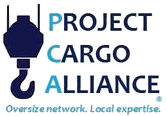

India’s logistics sector is undergoing a major transformation. Global trade expansion, government policies, and advanced technology are redefining how goods move across borders. Logistics companies are now crucial in helping businesses stay competitive and efficient in this evolving trade landscape.
As a leading logistics company in India, ECM Logistics offers end-to-end global shipping solutions — from international freight forwarding and sea and air cargo services to project cargo transport — tailored to the growing demands of exporters and importers.
In this article, we break down the latest trends, key opportunities, and how businesses can capitalise on the changing logistics ecosystem.
India’s emergence as a global manufacturing hub has led to a surge in demand for international logistics and cargo handling services. From electronics and textiles to pharmaceuticals and automotive goods, companies rely on efficient shipping partners to connect with global markets.
Boost in Exports: Initiatives like Make in India and trade agreements are driving outbound shipments.
E-commerce Growth: Cross-border e-commerce is fuelling demand for door-to-door delivery solutions.
Large-Scale Projects: Industrial development and infrastructure projects require specialised transport for heavy and oversized cargo.
Pro Tip: Choose a partner offering both sea and air freight options for maximum flexibility and cost savings.
The logistics industry in India is embracing digitalisation to replace manual processes with fast, transparent, and tech-driven operations.
IoT Tracking: 24/7 cargo monitoring for containers, breakbulk, and specialised freight.
AI & Predictive Analytics: Route optimisation, delay forecasting, and cost control.
Paperless Operations: Digital bills of lading, automated invoicing, and online customs clearance.
Real-time shipment tracking for sea and air cargo
Accelerated documentation and clearance processes
Integrated systems for seamless global logistics operations
Industries such as energy, construction, and manufacturing increasingly require project cargo transport for oversized and high-value shipments.
Industrial Expansion: Refineries, metro projects, and power plants depend on heavy-lift shipping.
Customised Planning: Includes route surveys, crane operations, and coordination between carriers and local transporters.
Cost-Efficiency: Sea freight remains the most viable option for moving large equipment.
Tip: Partner with an experienced project logistics company skilled in breakbulk and specialised cargo handling.
As environmental regulations tighten, green logistics practices are becoming essential.
Route Optimisation: Reduces fuel use and transit time
Eco-Friendly Packaging: Cuts down waste for international shipments
Alternative Fuels: Transitioning towards cleaner energy for cargo vessels
Adopting sustainable logistics improves operational efficiency while meeting environmental goals.
Massive infrastructure investments are reshaping India’s logistics industry. Policies such as the National Logistics Policy, Gati Shakti Plan, and Dedicated Freight Corridors are enabling faster, more reliable trade.
Reduced customs delays through digital systems
Improved port infrastructure for quicker cargo handling
Lower costs for exports originating from India thanks to better connectivity
An experienced logistics partner manages every stage of the supply chain — from documentation and customs clearance to last-mile delivery — ensuring smooth, compliant, and timely shipments.
End-to-end services in sea freight, air cargo, and project transport
Expertise in international trade compliance
Strong global network for secure, efficient delivery
Look for experience, global coverage, and advanced digital tools. ECM combines real-time tracking with project cargo expertise to deliver reliable results.
Sea Freight: Best for heavy, bulk, or oversized shipments
Air Freight: Ideal for urgent, high-value, or perishable goods ECM offers both, letting you choose based on time and budget.
Common documents include Bill of Lading, Commercial Invoice, Packing List, Certificate of Origin, and necessary permits.
Through breakbulk and project cargo solutions involving route surveys, cranes, and specialised carriers.
Digital platforms provide tracking, analytics, automated documentation, and faster customs clearance — making supply chains more agile and cost-efficient.
India’s freight forwarding industry is moving towards a future that is digital, sustainable, and highly specialised. To succeed, businesses need a logistics partner who can handle complex cargo requirements and deliver integrated, end-to-end solutions.





